学而优教育新徐路分校初三英语内部资料
Level2-U9-Ls3重点知识总结
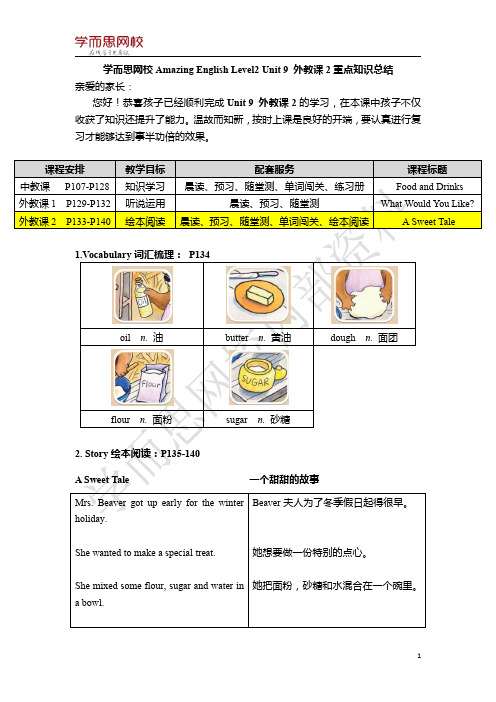
学而思网校Amazing English Level2Unit9外教课2重点知识总结
亲爱的家长:
您好!恭喜孩子已经顺利完成Unit9外教课2的学习,在本课中孩子不仅收获了知识还提升了能力。
温故而知新,按时上课是良好的开端,要认真进行复习才能够达到事半功倍的效果。
P134
butter n.黄油
We watch football on game day.We cheer on game day.We
play football on game day!
我们在比赛日看足球比赛。
我们在比赛日欢呼。
我们在比赛日踢足球!
4.Production :复述:P141
请您仔细阅读并保存好,帮助孩子进行梳理,希望在主讲老师的带动,辅导老师及家长的配合下,孩子能够从行为习惯、学习兴趣及成绩上有质的变化!
学而思网校英语产品部。
九年级提优班英语系列辅导资料(2)
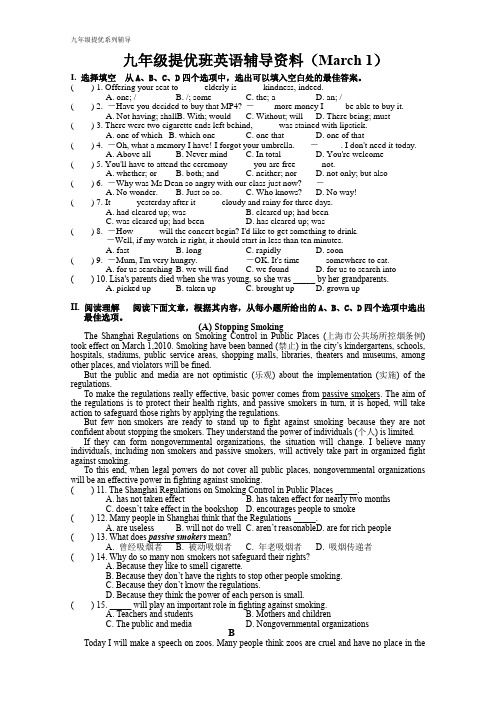
九年级提优班英语辅导资料(March 1)I. 选择填空从A、B、C、D四个选项中,选出可以填入空白处的最佳答案。
( ) 1. Offering your seat to _____ elderly is _____ kindness, indeed.A. one; /B. /; someC. the; aD. an; /( ) 2. -Have you decided to buy that MP4? -____ more money I ____ be able to buy it.A. Not having; shallB. With; wouldC. Without; willD. There being; must ( ) 3. There were two cigarette ends left behind, _____ was stained with lipstick.A. one of whichB. which oneC. one thatD. one of that( ) 4. -Oh, what a memory I have!I forgot your umbrella. -_____. I don't need it today.A.Above allB. Never mindC. In totalD.You're welcome( ) 5. You'll have to attend the ceremony _____ you are free _____ not.A. whether; orB. both; andC. neither; norD. not only; but also( ) 6. -Why was Ms Dean so angry with our class just now? -_____A. No wonder.B. Just so so.C. Who knows?D. No way!( ) 7. It _____ yesterday after it _____ cloudy and rainy for three days.A. had cleared up; wasB. cleared up; had beenC. was cleared up; had beenD. has cleared up; was( ) 8. -How _____ will the concert begin? I'd like to get something to drink.-Well, if my watch is right, it should start in less than ten minutes.A. fastB. longC. rapidlyD. soon( ) 9. -Mum, I'm very hungry. -OK. It's time _____ somewhere to eat.A. for us searchingB. we will findC. we foundD. for us to search into ( ) 10. Lisa's parents died when she was young, so she was _____ by her grandparents.A. picked upB. taken upC. brought upD. grown upII. 阅读理解阅读下面文章,根据其内容,从每小题所给出的A、B、C、D四个选项中选出最佳选项。
九年级英语全册教案培训资料.doc

Unit 1 How can we become good learners?学习目标认知目标:1. Talk about how to study. 学会讨论各种学习方法和策略。
2. Find out your suitable learning methods. 找出适合自己的学习方法。
情感目标:通过对学习方法的学习,培养学生用正确而科学的方法做事的能力,明白“一份耕耘,一份收获”。
技能目标:(1)熟练掌握下列词汇:aloud pronunciation discover repeat note pronounce increase speedpartner create active connect review knowledge wisely born attention (2)熟练掌握下列短语:work with friends ask the teacher for helpread aloud look up practice pronunciationconnect…with…pay attention to(3)掌握下列句型:How do you study English?I learn by working with a group.Do you learn English by reading aloud?Yes, I do. It helps my pronunciation.How can I read faster?You can read faster by reading word groups.How can I improve my pronunciation?One way is by listening to tapes.But whether or not you can do this well depends on your learning habits.重点、难点(Key points and difficulties)1. 学会运用how来询问做事方式2. 学会运用by + doing的结构表达做事方式。
九年级英语u2t3知识点

九年级英语u2t3知识点Unit 2 Topic 3 in Grade 9 English: Knowledge PointsIntroduction:In Grade 9 English, Unit 2 Topic 3 focuses on various knowledge points that are essential for understanding the language. These knowledge points are crucial for students to strengthen their English language skills. Let's explore these points in detail.1. Vocabulary Expansion:Vocabulary plays a vital role in language learning. In this unit, students are introduced to a wide range of new words and expressions. These words not only enhance their language proficiency but also enable them to express themselves more effectively. Students are encouraged to memorize and practice using these words in different contexts to improve their vocabulary skills.2. Sentence Structure:Understanding sentence structure is fundamental to constructing grammatically correct sentences. In Unit 2 Topic 3, students learn about the different components of a sentence, such as subject, verb, object, and adverbial phrases. They also acquire knowledge of sentencepatterns, including simple sentences, compound sentences, and complex sentences. This knowledge helps students in forming coherent and well-structured English sentences.3. Grammar Rules:Grammar forms the backbone of any language. Topic 3 introduces several grammar rules that help students to communicate accurately. Some important grammar points covered include verb tenses, the use of articles, adjectives and adverbs, and subject-verb agreement. By grasping these grammar rules, students can avoid common errors and improve their overall language proficiency.4. Reading Comprehension:The ability to comprehend written texts is an essential skill in language learning. In this unit, students practice reading comprehension by analyzing and interpreting various types of texts, including articles, short stories, and dialogues. They learn to identify main ideas, supporting details, and the author's purpose. Moreover, students are encouraged to make connections between the text and their own experiences, enhancing their critical thinking skills.5. Writing Skills:Writing is a crucial aspect of language learning. Unit 2 Topic 3 focuses on developing students' writing skills through various writing tasks. Students learn to write informative and descriptive paragraphs, narrative essays, and letters. They are taught the importance of proper sentence structure, logical organization, and using appropriate vocabulary and grammar. These skills enable students to express their thoughts and ideas clearly and persuasively in written form.6. Speaking and Listening:Effective communication involves both speaking and listening skills. In this unit, students engage in dialogues, group discussions, and presentations to practice their speaking and listening abilities. They learn to express opinions, ask questions, and engage in conversations using appropriate expressions and intonation. This helps students become confident speakers and attentive listeners in real-life situations.Conclusion:Unit 2 Topic 3 in Grade 9 English covers a broad range of knowledge points that are essential for students to improve their English language skills. These points include vocabulary expansion, sentence structure, grammar rules, reading comprehension, writing skills, as well as speaking and listening abilities. By mastering theseknowledge points, students can enhance their overall language proficiency and become confident English users.。
新初三暑假班讲义 一 名词复数
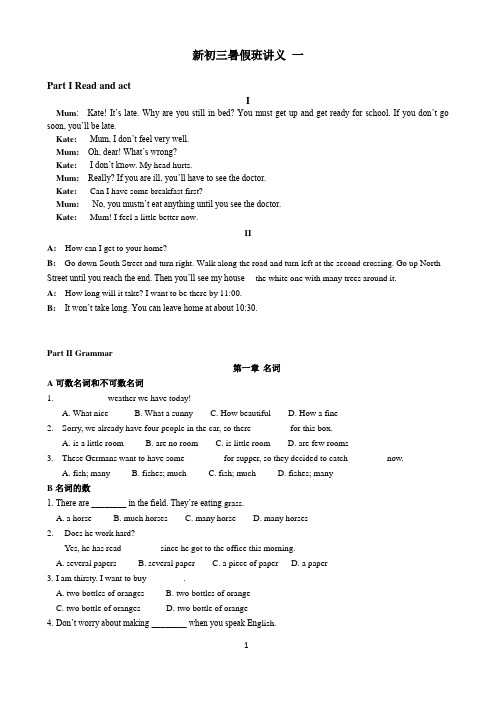
新初三暑假班讲义一Part I Read and actIMum: Kate! It’s late. Why are you still in bed? You must get up and get ready for school. If you don’t go soon, you’ll be late.Kate:Mum, I don’t feel very well.Mum: Oh, dear! What’s wrong?Kate: I don’t kn ow. My head hurts.Mum:Really? If you are ill, you’ll have to see the doctor.Kate:Can I have some breakfast first?Mum: No, you mustn’t eat anything until you see the doctor.Kate: Mum! I feel a little better now.IIA:How can I get to your home?B:Go down South Street and turn right. Walk along the road and turn left at the second crossing. Go up North Street until you reach the end. Then you’ll see my house--- the white one with many trees around it.A:How long will it take? I want to be there by 11:00.B:It won’t take long. You can leave home at about 10:30.Part II Grammar第一章名词A可数名词和不可数名词1.__________ weather we have today!A. What niceB. What a sunnyC. How beautifulD. How a fine2.Sorry, we already have four people in the car, so there ________ for this box.A. is a little roomB. are no roomC. is little roomD. are few rooms3.These Germans want to have some ________ for supper, so they decided to catch ________ now.A. fish; manyB. fishes; muchC. fish; muchD. fishes; manyB名词的数1. There are ________ in the field. They’re eating grass.A. a horseB. much horsesC. many horseD. many horses2. ---Does he work hard?---Yes, he has read ________ since he got to the office this morning.A. several papersB. several paperC. a piece of paperD. a paper3. I am thirsty. I want to buy ________.A. two bottles of orangesB. two bottles of orangeC. two bottle of orangesD. two bottle of orange4. Don’t worry about making ________ when you speak En glish.A. clothesB. mistakesC. friendsD. things5. Lucy will show us some new ________ of hers.A. photoB. photosC. photoes6. Last night, there was a food accident. Ten ________ were ill, but no ________were lost.A. child, livesB. children, lifeC. children, livesD. child, life7. It’s good to have __________ every day.A. two glass of milkB. two glass of milksC. two glasses of milkD. two glasses of milks8. ________eat a lot of rice and fish.A. JapanesesB. JapaneseC. Japan peopleD. People of Japanese9. Some ________ are flying kites near the river.A. childB. boyC. boysD. childs10. He had something to write down and asked me for _______.A. a paperB. some papersC. some pieces of papersD. a piece of paper11. My mother bought ________ for me yesterday.A. a pair of glassesB. a pair of glassC. a glassesD. a glass12. There are some ________ on the ground.A. leafsB. leafC. leaves13. Jenny’s shoes were worn out. She wanted to buy a new ________.A. shoeB. shoesC. oneD. pair14. We have bought two ________ for the coming party.A. box of appleB. boxes of applesC. box of applesD. boxes of apple15. Look! Two ________ are talking happily under the apple tree.A. man teacherB. man teachersC. men teachersD. men teacherPart III Complete the following sentences1.你在悉尼待了多久?__________________ you ___________ in Sydney?2.他今天不是和你在一起吗?__________ he _________________ today?3.杭州以西湖闻名遐迩。
九年级提优班英语系列辅导资料(5)
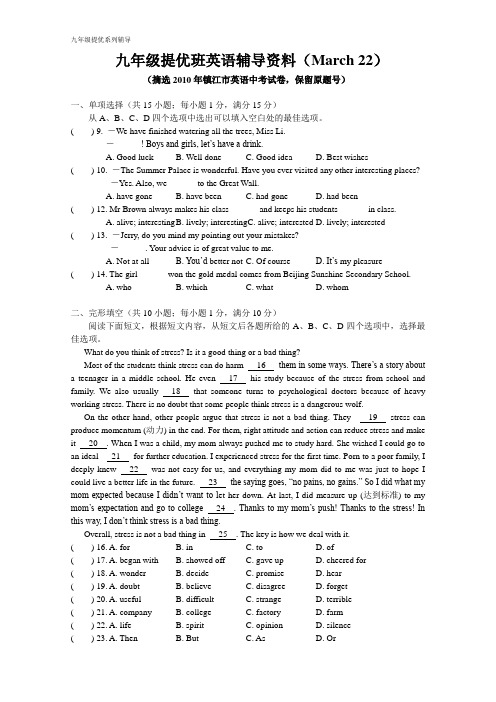
九年级提优班英语辅导资料(March 22)(摘选2010年镇江市英语中考试卷,保留原题号)一、单项选择(共15小题;每小题1分,满分15分)从A、B、C、D四个选项中选出可以填入空白处的最佳选项。
( ) 9. -We have finished watering all the trees, Miss Li.-______! Boys and girls, let’s have a drink.A. Good luckB. Well doneC. Good ideaD. Best wishes( ) 10. -The Summer Palace is wonderful. Have you ever visited any other interesting places?-Yes. Also, we ______ to the Great Wall.A. have goneB. have beenC. had goneD. had been( ) 12. Mr Brown always makes his class ______ and keeps his students ______ in class.A. alive; interestingB. lively; interestingC. alive; interestedD. lively; interested( ) 13. -Jerry, do you mind my pointing out your mistakes?-______. Your advice is of great value to me.A. Not at allB. You’d better notC. Of courseD. It’s my pleasure( ) 14. The girl ______ won the gold medal comes from Beijing Sunshine Secondary School.A. whoB. whichC. whatD. whom二、完形填空(共10小题;每小题1分,满分10分)阅读下面短文,根据短文内容,从短文后各题所给的A、B、C、D四个选项中,选择最佳选项。
九年级第二单元知识点英文
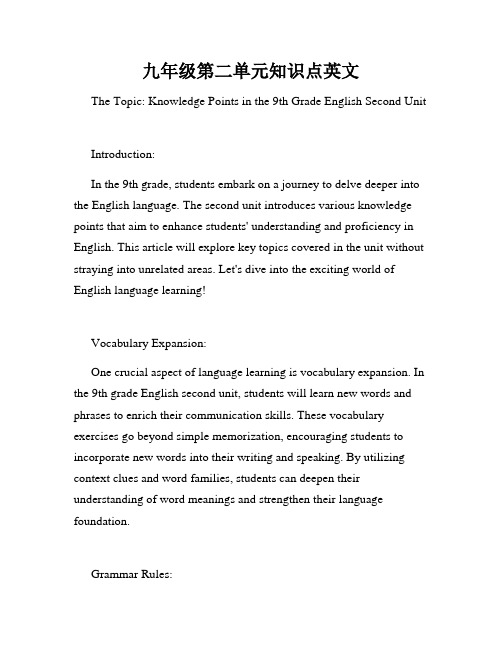
九年级第二单元知识点英文The Topic: Knowledge Points in the 9th Grade English Second UnitIntroduction:In the 9th grade, students embark on a journey to delve deeper into the English language. The second unit introduces various knowledge points that aim to enhance students' understanding and proficiency in English. This article will explore key topics covered in the unit without straying into unrelated areas. Let's dive into the exciting world of English language learning!Vocabulary Expansion:One crucial aspect of language learning is vocabulary expansion. In the 9th grade English second unit, students will learn new words and phrases to enrich their communication skills. These vocabulary exercises go beyond simple memorization, encouraging students to incorporate new words into their writing and speaking. By utilizing context clues and word families, students can deepen their understanding of word meanings and strengthen their language foundation.Grammar Rules:Grammar serves as the backbone of any language, and a strong grasp of English grammar is paramount. The second unit emphasizes several grammar points, including verb tenses, sentence structures, and subject-verb agreement. Through grammar exercises and interactive activities, students will understand the mechanics of forming correct sentences and expressing ideas accurately. Solidifying these grammar rules serves as a stepping stone for effective communication in both spoken and written English.Reading Comprehension:The ability to comprehend written text is vital for students' overall language development. In the 9th grade English second unit, reading comprehension activities are designed to sharpen students' understanding and analytical skills. Exploring various text genres, such as fiction, non-fiction, and poetry, students learn how to identify main ideas, infer information, and draw conclusions. Engaging with diverse texts also broadens students' worldview and nurtures their critical thinking abilities.Writing Skills:Effective writing transcends meticulous grammar and rich vocabulary. In this unit, students will be exposed to various writing formats, including essays, letters, and narratives. Students will learn thefundamentals of structuring paragraphs, organizing their thoughts, and developing coherent arguments. Moreover, they will be encouraged to express their ideas creatively, fostering their individual writing style. Through constructive feedback and revision, students will refine their writing skills, making strides towards becoming proficient English writers.Listening and Speaking:Language learning is incomplete without honing listening and speaking skills. The second unit devotes ample time to improving these essential components of communication. Through listening exercises, students will enhance their ability to understand both native and non-native accents. Various speaking activities, such as role plays and presentations, encourage students to express themselves confidently and fluently. These interactive tasks foster teamwork, critical thinking, and creativity among students.Conclusion:The 9th grade English second unit encompasses a comprehensive range of knowledge points that elevate students' language proficiency. From vocabulary expansion and grammar rules to reading comprehension and writing skills, every aspect of language learning is thoughtfully incorporated. By delving into these topics, students gainthe tools and confidence to navigate the English language successfully. Ultimately, the second unit prepares students for further language advancement and equips them with valuable skills for future endeavors.。
九年级初中英语精品教案:Unit 10 Section B 第一课时
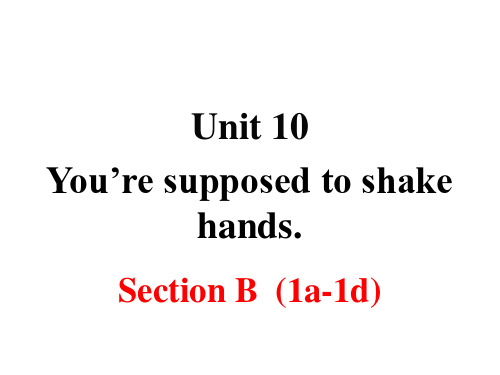
expected to start eating first. T F
4. In France, you’re supposed to put
your bread on the table.
TF
5. In China, it’s impolite to use your
chopsticks to hit an empty bowl. T F
2. —We’re supposed to… —Yes, and it’s impolite to…
➢ Learned some table manners
Homework
1. Look up the customs of the country you’re interested in.
2. Preview the passage in 3a. 3. Do the exercises in students’ book.
In France/America
You’re not supposed to eat with your hands.
In India, you’re supposed to eat with your hands.
In China, you are not supposed to stick your chopsticks into the food.
2. —We’re supposed to…
—Yes, and it’s impolite to…
➢ Learn some table manners
Lead in
Table manners around the world.
There are many table manners around the world. But different countries have different culture. …
山东省济宁市学而优教育咨询有限公司中考英语复习 语
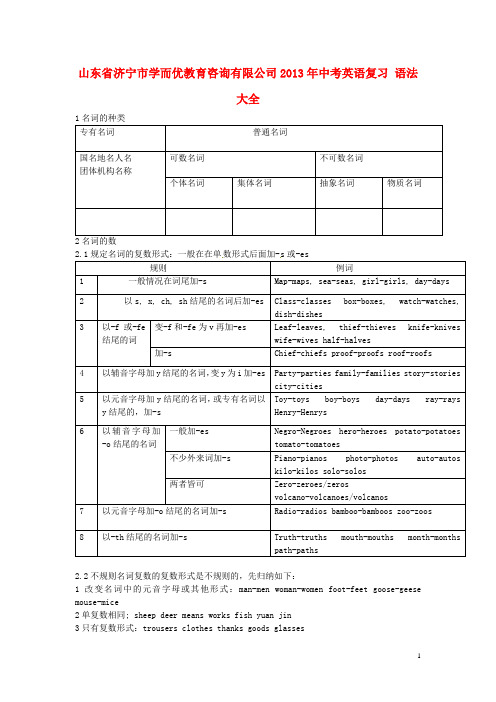
山东省济宁市学而优教育咨询有限公司2013年中考英语复习语法大全专有名词普通名词国名地名人名团体机构名称可数名词不可数名词个体名词集体名词抽象名词物质名词2名词的数2.1规定名词的复数形式:一般在在单数形式后面加-s或-es规则例词1 一般情况在词尾加-s Map-maps, sea-seas, girl-girls, day-days2 以s, x, ch, sh结尾的名词后加-es Class-classes box-boxes, watch-watches,dish-dishes3 以-f或-fe结尾的词变-f和-fe为v再加-es Leaf-leaves, thief-thieves knife-kniveswife-wives half-halves加-s Chief-chiefs proof-proofs roof-roofs4 以辅音字母加y结尾的名词,变y为i加-es Party-parties family-families story-storiescity-cities5 以元音字母加y结尾的名词,或专有名词以y结尾的,加-s Toy-toys boy-boys day-days ray-rays Henry-Henrys6 以辅音字母加-o结尾的名词一般加-es Negro-Negroes hero-heroes potato-potatoestomato-tomatoes不少外来词加-s Piano-pianos photo-photos auto-autoskilo-kilos solo-solos两者皆可Zero-zeroes/zerosvolcano-volcanoes/volcanos7 以元音字母加-o结尾的名词加-s Radio-radios bamboo-bamboos zoo-zoos8 以-th结尾的名词加-s Truth-truths mouth-mouths month-monthspath-paths2.2不规则名词复数的复数形式是不规则的,先归纳如下:1改变名词中的元音字母或其他形式:man-men woman-women foot-feet goose-geesemouse-mice2单复数相同; sheep deer means works fish yuan jin3只有复数形式:trousers clothes thanks goods glasses4一些集体名词总是用作复数:people police5部分集体名词既可以作单数(整体)也可以作复数(成员):class family crowd couple group government population team public party6复数形式表示特别含义:customs(海关)times(时代)spirits(情绪)drinks(饮料)sands(沙滩)papers(文件报纸)looks(外表)brains(头脑智力)greens(青菜)7表示某国人7.1直接加-s:Americans Australians Germans Greeks Swedes Europeans7.2单复数同行:Swiss Portuguese Chinese Japanese7.3以-man或-woman结尾的改为-men或-women:Englishmen Frenchwomen8合成名词8.1将主体名词变为复数:sons-in-law lookers-on passers-by story-tellers boy friends 8.2无主体名词的将最后一部分改为复数:grown-ups housewives stopwatches8.3将两部分变为复数:women singers, men servants三名词的所有格名词在句中表示所有关系的语法形式叫做名词所有格,分为两种情况:一是名词词尾加’s构成,二是有介词of加名词构成。
山东省济宁市学而优教育咨询有限公司2022年中考英语复习 语法总结
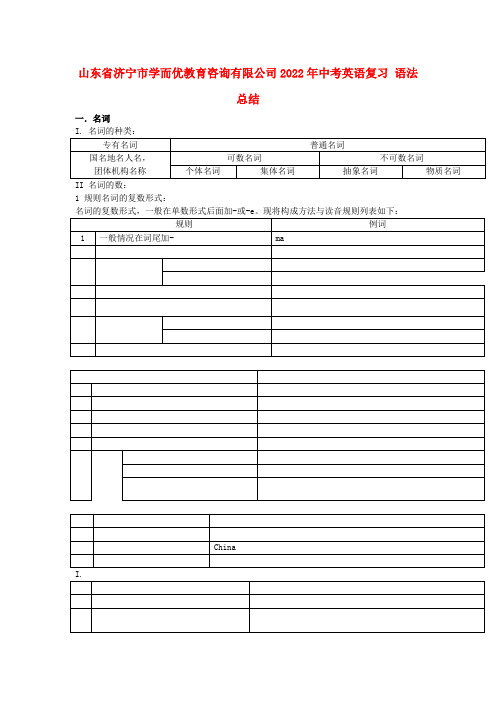
山东省济宁市学而优教育咨询有限公司2022年中考英语复习语法总结一.名词I. 名词的种类:II 名词的数:1 规则名词的复数形式:I.Beijing七.情态动词II 情态动词mut, ma, might, coud, can表示推测:以mut为例。
mut dobe是推测现在存在的一般状态进行;mut be doing 推测可能正在进行的事情;mut have done是推测可能已经发生过的事情。
1 mut“肯定,一定”语气强,只用于肯定句中。
He mut be a man from America / He mut be taing with hi friend / He mut have aread arrived there2 ma和might“也许”,后者语气弱,更没有把握。
可用于肯定句和否定句。
He ma not be at home / The might have finihed their ta3 can和coud“可能”,coud表示可疑的可能性,不及can’t语气强,用于肯定、否定、疑问句中。
The weather in that cit coud be cod now(推测某事本来可能发生,但实际上没有发生)Can he be in the office now No, he can’t be there, for I aw him in the ibrar ut now语气很强,常用于疑问和否定句中八.非谓语动词I. 非谓语动词的分类、意义及构成:九.定语从句I. 定语从句起了形容词的作用,在句中修饰一个名词或代词。
被修饰的词叫做先行词,引导定语从句的词叫关系词,他的作用一是放在先行词与定语从句中间起了连接作用,二是。
配套K12九年级英语全册Unit8DiscoveriesLesson23Discoveryofthe
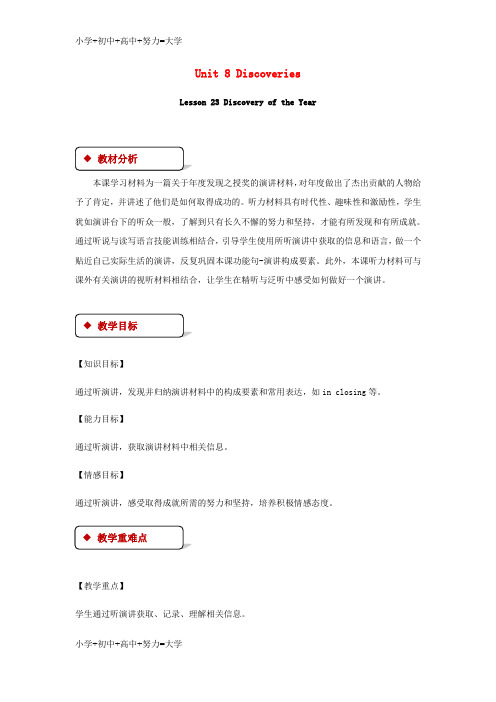
Unit 8 DiscoveriesLesson 23 Discovery of the Year本课学习材料为一篇关于年度发现之授奖的演讲材料,对年度做出了杰出贡献的人物给予了肯定,并讲述了他们是如何取得成功的。
听力材料具有时代性、趣味性和激励性,学生犹如演讲台下的听众一般,了解到只有长久不懈的努力和坚持,才能有所发现和有所成就。
通过听说与读写语言技能训练相结合,引导学生使用所听演讲中获取的信息和语言,做一个贴近自己实际生活的演讲,反复巩固本课功能句-演讲构成要素。
此外,本课听力材料可与课外有关演讲的视听材料相结合,让学生在精听与泛听中感受如何做好一个演讲。
【知识目标】通过听演讲,发现并归纳演讲材料中的构成要素和常用表达,如in closing等。
【能力目标】通过听演讲,获取演讲材料中相关信息。
【情感目标】通过听演讲,感受取得成就所需的努力和坚持,培养积极情感态度。
【教学重点】学生通过听演讲获取、记录、理解相关信息。
【教学难点】学生综合运用所学语言,口头复述听力材料中的演讲(可模仿)。
1. 课前准备:调试光盘与课件、给学生分组、为学生布置预习作业等;2. 教具学具:光盘、大卡片等。
Step1. Warm-up1. Skip the words in Exercise 2 and let students learn the expressions indicating time order.2. Teach the meaning of these expressions and encourage students to use them. Step2. Listening1. Listen to the speech and check the order.2. Listen again and justify whether statements are correct or not.3. Fill in the blanks to complete the speech material.4. Take turns summarizing the speech.Step3. Language points1. have respect for 尊敬[重],重视You must have respect for the feelings of others.have respect to 牵涉到,关系到2. honour v.尊敬;给予表扬;信守The two sides agreed to honour a new ceasefire.3. closing n.终结;结尾辞;4. applause n.热烈鼓掌;喝彩;掌声His speech was greeted with a storm of applause.Step4. Consolidation1. Read the material with the tape.2. Listen and have a dictation.3. Let students share with their ideas of discoveries.4. Make a speech about the topic in Exercise 7 in pairs.5. Learn some key expression making a formal speech.Step5. HomeworkWrite a short speech. Then give your speech to the class. 略。
山东省济宁市学而优教育咨询有限公司中考英语复习 语法归纳
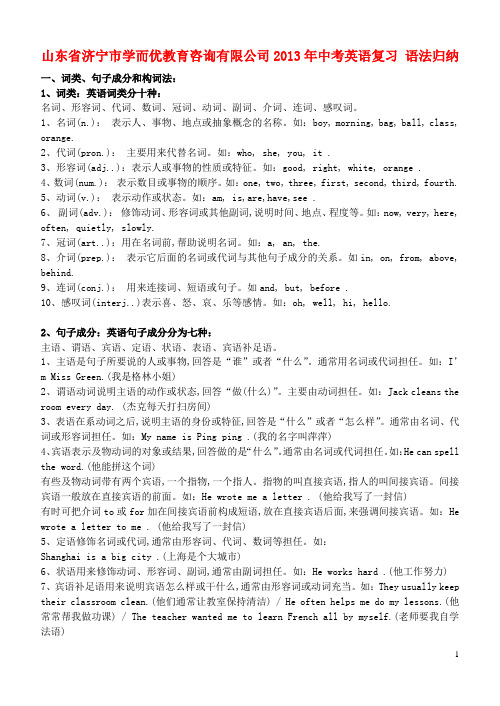
山东省济宁市学而优教育咨询有限公司2013年中考英语复习语法归纳一、词类、句子成分和构词法:1、词类:英语词类分十种:名词、形容词、代词、数词、冠词、动词、副词、介词、连词、感叹词。
1、名词(n.):表示人、事物、地点或抽象概念的名称。
如:boy, morning, bag, ball, class, orange.2、代词(pron.):主要用来代替名词。
如:who, she, you, it .3、形容词(adj..):表示人或事物的性质或特征。
如:good, right, white, orange .4、数词(num.):表示数目或事物的顺序。
如:one, two, three, first, second, third, fourth.5、动词(v.):表示动作或状态。
如:am, is,are,have,see .6、副词(adv.):修饰动词、形容词或其他副词,说明时间、地点、程度等。
如:now, very, here, often, quietly, slowly.7、冠词(art..):用在名词前,帮助说明名词。
如:a, an, the.8、介词(prep.):表示它后面的名词或代词与其他句子成分的关系。
如in, on, from, above, behind.9、连词(conj.):用来连接词、短语或句子。
如and, but, before .10、感叹词(interj..)表示喜、怒、哀、乐等感情。
如:oh, well, hi, hello.2、句子成分:英语句子成分分为七种:主语、谓语、宾语、定语、状语、表语、宾语补足语。
1、主语是句子所要说的人或事物,回答是“谁”或者“什么”。
通常用名词或代词担任。
如:I’m Miss Green.(我是格林小姐)2、谓语动词说明主语的动作或状态,回答“做(什么)”。
主要由动词担任。
如:Jack cleans the room every day. (杰克每天打扫房间)3、表语在系动词之后,说明主语的身份或特征,回答是“什么”或者“怎么样”。
山东省济宁市学而优教育咨询有限公司中考英语复习 语法汇总
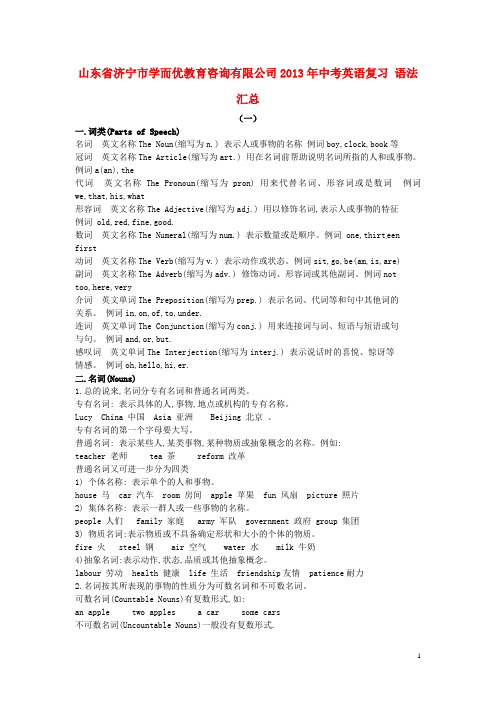
山东省济宁市学而优教育咨询有限公司2013年中考英语复习语法汇总(一)一.词类(Parts of Speech)名词英文名称The Noun(缩写为n.) 表示人或事物的名称例词boy,clock,book等冠词英文名称The Article(缩写为art.) 用在名词前帮助说明名词所指的人和或事物。
例词a(an),the代词英文名称The Pronoun(缩写为pron) 用来代替名词、形容词或是数词例词we,that,his,what形容词英文名称The Adjective(缩写为adj.) 用以修饰名词,表示人或事物的特征例词 old,red,fine,good.数词英文名称The Numeral(缩写为num.) 表示数量或是顺序。
例词 one,thirt eenfirst动词英文名称The Verb(缩写为v.) 表示动作或状态。
例词sit,go,be(am,is,are)副词英文名称The Adverb(缩写为adv.) 修饰动词、形容词或其他副词。
例词not too,here,very介词英文单词The Preposition(缩写为prep.) 表示名词、代词等和句中其他词的关系。
例词in,on,of,to,under.连词英文单词The Conjunction(缩写为conj.) 用来连接词与词、短语与短语或句与句。
例词and,or,but.感叹词英文单词The Interjection(缩写为interj.) 表示说话时的喜悦、惊讶等情感。
例词oh,hello,hi,er.二.名词(Nouns)1.总的说来,名词分专有名词和普通名词两类。
专有名词: 表示具体的人,事物,地点或机构的专有名称。
Lucy China 中国Asia 亚洲Beijing 北京。
专有名词的第一个字母要大写。
普通名词: 表示某些人,某类事物,某种物质或抽象概念的名称。
例如:teacher 老师 tea 茶 reform 改革普通名词又可进一步分为四类1) 个体名称: 表示单个的人和事物。
SectionA学练优九年级英语课件-公开课UnitCouldyoupleasetellmewher
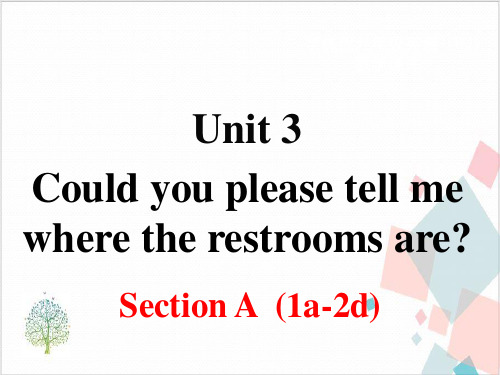
library
Could you please tell me where I can …?
(教学提纲)SectionA学练优九年级 英语课 件-公开 课Unit Couldy ouplea setell mewher ethere stroom sare公 开课-p pt下载 【优质 公开课 推荐】
Where can we …?
take out money get some money save money
存钱
(教学提纲)SectionA学练优九年级 英语课 件-公开 课Unit Couldy ouplea setell mewher ethere stroom sare公 开课-p pt下载 【优质 公开课 推荐】
Street.
some stamps. ?
(教学提纲)SectionA学练优九年级 英语课 件-公开 课Unit Couldy ouplea setell mewher ethere stroom sare公 开课-p pt下载 【优质 公开课 推荐】
(教学提纲)SectionA学练优九年级 英语课 件-公开 课Unit Couldy ouplea setell mewher ethere stroom sare公 开课-p pt下载 【优质 公开课 推荐】
bank
(教学提纲)SectionA学练优九年级 英语课 件-公开 课Unit Couldy ouplea setell mewher ethere stroom sare公 开课-p pt下载 【优质 公开课 推荐】
Where can we …? get a pair of shoes
- 1、下载文档前请自行甄别文档内容的完整性,平台不提供额外的编辑、内容补充、找答案等附加服务。
- 2、"仅部分预览"的文档,不可在线预览部分如存在完整性等问题,可反馈申请退款(可完整预览的文档不适用该条件!)。
- 3、如文档侵犯您的权益,请联系客服反馈,我们会尽快为您处理(人工客服工作时间:9:00-18:30)。
学而优教育新徐路分校初三英语内部资料
主讲:郭茜
一、从结构上区别
现在完成时:主语+ have / has + 过去分词(肯定式)
主语+ have / has + not + 过去分词(否定式)
Have / Has + 主语+ 过去分词(疑问式)
过去完成时:主语+ had + 过去分词(肯定式)
主语+had + not + 过去分词(否定式)
Had + 主语+ 过去分词(疑问式)
(二)从时间状语区别
现在完成时: 常用的时间状语包括“now, today, tonight, this week, this year, already, yet, just, recently…etc”. 过去完成时: 常用的时间状语包括“by, at, before等构成的短语”.
注意:当表示一段时间,现在完成时和过去完成时都可以用for 或since引导的状语.
例如:Have you had your lunch yet? 你吃午饭了吗?
Yes, I have . I’ve just had it. 是的,我刚吃完.
I have had a clock now. 我现在有一个闹钟了.
Have you already posted the photos? 你把照片寄走了吗?
The meeting had begun when we got there. 我们到那儿时,会议已经开始了.
We had learned about 5000English words by the end of last term.
到上学期末我们已经学了5000个英语单词.
They had done the work at five o’clock. 在五点钟的时候他们已经完成了那项工作.
I’ve known Li Lei for three years. 我认识李蕾已经三年了.
I have worked here since ten years ago. 自从十年前我就在这工作.
We had not heard from him since we left here. 自从我们离开以来一直没有收到他的来信.
They had then been without sleep for twenty-four hours.这时他们已经有24个小时没有合眼了.
(三)使用时注意事项
使用现在完成时应该注意:
1.“have/ has got ”形式上是一种完成时,但和have/ has 为同一意义,即“有”.
例如:Have you got a pen-friend? 你有笔友吗?
Yes, I have. 是的,我有.
Has he got a lot of work to do? 他有许多工作要做吗?
No, he hasn’t. 不,他没有.
2. have/ has gone to 与have/has been to 的区别
have/ has gone to 强调“去而未归”;have/ has been to 强调“去而归还”. have/ has
been to常和once, twice, never, ever连用;have/ has gone to则不可.例如:
—Have Jack ever been to Beijing? 杰克去过北京吗?
—Yes, he’s been there several times. 是的,他去过好几次了.
—Where have Mary and Tom gone? 玛丽和汤姆去哪里了?
—They’ve gone to London. 他们去伦敦了.
3.非延续性动词不能用于“现在完成时+ 表示一段时间的状语”的句型中.
这类动词有:come, go, start, leave, die, buy, finish, join, borrow, stop等.但它们能够
用表示持续状态的相应的延续性动词替换句中的终止性动词.例如:
arrive, come →be here, be in
begin, start →be on
buy →have
die →be dead
fall asleep(ill) →be asleep (ill)
finish, end →be over
get to know →know
get up →be up
go out →be out
join →be in , be a + 名词
leave, move →be away, be out of
使用过去完成时应该注意:
如果两个动作紧接着发生,则常常不用过去完成时.例如:
When she came into the room, she found them sitting together singing.
她进屋时看见他们坐在一起唱歌.
After we said good-bye to our friends, we left the village.
在和朋友告别之后我们就离开村子.
---------------------------------------------------
现在完成时和过去完成时的区别与用法:
现在完成时着眼于现在,强调过去发生的某动作对现在造成的影响和结果,或是由过去持续到现在的动作.
I have cleaned the classroom .(强调扫地所产生的结果:地干净了!)
We have lived here for ten years.(“住”从过去持续到现在的动作用现在完成时)
We have lived here since we came here.(“住”是从过去持续到现在的动作用现在完成时)
过去完成时则主要体现过去发生的两动作的先后有别,表达的是“过去的过去”,即比过去发生的某动作都还要“过去”,两动作中先发生的就用过去完成时,后发生的则只用一般过去时.运用过去完成时的句子往往有两过去的时间或动作,一定要注意这点哟!
Mr Green had lived in New York for ten years before he came to China.("来”中国已过去,而先前“住”在纽约更过去!)(另外注意:“住”在纽约可没有持续到现在哟!)
We had learned 1000 words by the end of last term.
(“上期期末”已过去,而是在其前“学”的就更过去了!)
-------------------------------------------------------
现在完成时与一般过去时的区别
1. 一般过去时表示过去某个时间发生的事、存在的状态或经常发生的动作.说话的侧重点只在于陈述一件过去的事情,不强调对“现在”产生的影响.如:
He visited Guilin in 1998.他1998年参观过桂林.(只说明去桂林的时间)
2. 现在完成时表示动作发生在过去,对现在造成了影响或产生了结果.不与确定的过去时间状语连用.如:
Jill has bought a new computer.吉尔买了一台新电脑.(着重点是现在有了一台新电脑)
3. 两种时态的区分
(1)一般过去时的谓语动词用过去式,而现在完成时的谓语基本构成是“助动词have /has +过去分词”.如:(2)一般过去时通常与表示过去的时间状语连用.如:yesterday, last week, two years ago, just now, in 2002等;而现在完成时则常与just, already, ever, never等副词和these days, this week, since..., for...等表示一段时间的状语连用.
看看以下的几组句子,有什么区别?
①Have you seen the film?(A)
Did you see the film?(B)
[说明] 你看过这部电影吗?(A)句强调的是被问者对剧情是否了解;(B)句强调的是看这部电影的动作是否发生过,并不强调是否知道其内容.
②How has he done it?(A)
How did he do it?(B)
[说明]他是怎么做的这件事?(A)句强调的是他做这件事的方式对现在产生了某种影响;(B)句单纯的
询问做这件事的方式.
③He has lived in Beijing for 8 years.(A)
He lived in Beijing for 8 years.(B)
[说明]他在北京住了8年.(A)句讲的是到目前为止他在北京住了8年,可能还会继续在北京住下去.(B)句讲的是他在北京住过8年,现在不在北京了.。
